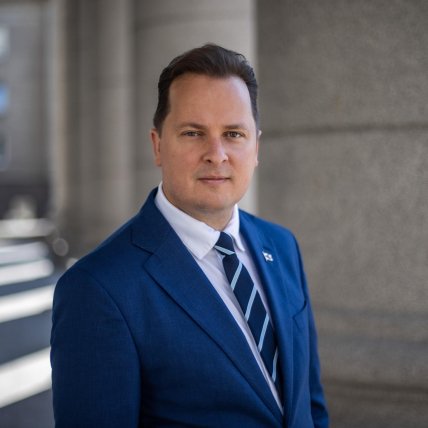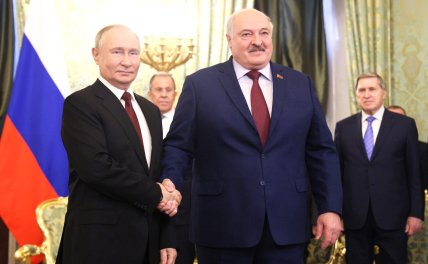Lukashenko's regime could collapse swiftly; it's the weakest link in Putin's machinery, according to Tikhanovskaya's advisor.
In January 2025, presidential elections will take place in Belarus – the Russia-backed dictator Alexander Lukashenko has already announced his intention to run for another term. He has been in power for 30 years and seems unwilling to change anything.
In an interview with "Telegraph", Franak Viachorka, chief advisor to democratic leader of Belarus, Sviatlana Tsikhanouskaya, spoke about the terror Lukashenko inflicts on Belarusians, the potential fall of the dictator's regime, and its implications for the Kremlin.
These "elections" are not a turning point
— Lukashenko claimed that "the elections in Belarus will be clean and orderly." Should we interpret this to mean that the script and outcome are already predetermined?
— It will resemble a military operation more than actual elections. Lukashenko has been traumatized since 2020, when he nearly lost power by allowing an alternative vote.
*In August 2020, the Central Election Commission of Belarus declared Alexander Lukashenko the winner of the elections. His main opponent, Sviatlana Tsikhanouskaya, reportedly received over 10% of the votes, coming in second. The election results were falsified by Lukashenko, leading to mass protests across the country.
Currently, there will be no other candidates, observers, or even any semblance of an electoral process or vote counting. He needs to execute this quickly and quietly in winter when temperatures drop to minus 30 degrees outside, making people less likely to go out. He fears protests.
And then he can say: "Let's turn the page and pretend that 2020 never happened, that Tsikhanouskaya never existed, and we will conduct business as usual."
Primarily, these elections are for Lukashenko himself and his psychological state. Not for the Belarusians, nor even for the West.
For Lukashenko, it’s about regaining some sense that he is still president, as even his entourage no longer believes that. They view him literally as Putin's puppet.
— I read that he even banned any opposition parties. How does the regime combat any manifestation of dissenting opinions?
— All parties have been liquidated over the past two years, and all political party leaders are either imprisoned, in exile, or in hiding. Anyone who has lived abroad at any point cannot run for president. Neither Tsikhanouskaya nor Latushko (former Minister of Culture of the Republic of Belarus, Deputy Head of the United Transitional Cabinet of Belarus, ed.) can run, nor anyone else for that matter.
Even if you had any type of residence permit abroad five years ago — that's it, you can no longer be president. We joke that there will soon be a law stating that only someone with presidential experience can be president.
— Yes, and only with 30 years of experience.
— Exactly. We already know the spoilers (candidates in the elections with no chance of winning. — Ed.), whom he has appointed. These are people from Lukashenko's inner fan club. There’s some communist, a veteran, the police spokesperson, and they all appear under the slogan "We are here to support Lukashenko."
Therefore, we call for the non-recognition of Lukashenko, his elections, and his authority. In 2020, Belarusians declared their support for democracy, freedom, and a European path of development. Sviatlana Tsikhanouskaya represents Belarus until new, genuine elections are held.
For us, nothing changes, and we hope the same goes for our partners.

— What is the strategy of the democratic forces in Belarus for these elections? How are you working with both the West and Belarusians to convey your position?
— It’s important to show that this is a farce. Don’t let Lukashenko turn the page.
We aim to document not only the violations occurring within the electoral process but also the entire terror. We are witnessing a mass cleanup before the elections. In recent days, up to a hundred people have been detained in various parts of Belarus. They are arrested for comments, for speaking Belarusian.
Anyone who once worked in non-governmental organizations even 10–15 years ago instantly becomes an enemy of the people, along with their entire family. The current situation is such that even the children of people who have never been in prison are not allowed to participate in school theater performances, to perform, or to appear in advertisements. It's reminiscent of the Stalinist era.
Thus, our primary task is to showcase this. Secondly, we aim to achieve non-recognition of these elections and Lukashenko by the international community.
On election day, we call on people to simply boycott them. But since citizens are being forcibly driven to polling stations, we urge them to vote against all to demonstrate protest.
However, I don’t believe these elections will change anything. This is not our turning point. Rather, such a moment will be tied to Ukraine's victory, which is much more important for us.
Yet another task is to mobilize supporters and show Belarusians an alternative. A European, peaceful, democratic alternative.
Lukashenko is pushing our country into Russia, while we demonstrate what the alternative could be. We also need to work with the nomenklatura, where people do not support Lukashenko as he would like.
"Russia cheaply controls Belarus through Lukashenko"
— Regarding Russia's influence. Can we expect that after the elections, pressure and demands from Putin on Lukashenko will intensify?
— I simply don’t know what more could happen because any occupation or formal Russian authority will lead to rebellion, protests, and instability, and neither Putin nor Lukashenko have the strength to open a new front. For Putin and Lukashenko, the status quo is extremely advantageous.
Lukashenko provides military products, helps circumvent sanctions, and offers air space for "shakheds" when needed – for tanks. The maximum Lukashenko can do without risking himself and Putin is already in place. The migration crisis is being orchestrated so that Poland spends money on border protection instead of supporting Ukraine.
Russia controls Belarus cheaply through Lukashenko, and considers this a military expense. This is much cheaper than the actual military expenses it incurs in Ukraine.
— The symbiosis of the two dictators will continue to exist in the same form.
— Yes.

— There have been some reports, including in Russian media, suggesting that Lukashenko has had some contacts with Western representatives. Do you know anything about this and what those contacts might have been about?
— I think that’s nonsense. Lukashenko often confuses wishful thinking with reality; nobody communicates with him at a high level because he is not taken seriously. But perhaps he dreamt it, or some lobbyists visited him. There are many lobbying campaigns, including those funded by Russia, aimed at laundering the image of dictators, and then going to the West to say: "Well, it’s not all that clear-cut." And perhaps such a meeting was organized for him, but none of our partners have held such meetings with him.
With the help of Western countries, we have communication regarding the release of political prisoners. However, we see that Lukashenko is afraid and does not release even those who are dying in prisons.
At the same time, Lukashenko would like to be at the negotiating table regarding Ukraine. He talks about it very often.
Lukashenko is the weakest link in Putin's military machine. Many in the West do not understand this. If Lukashenko falls, it will strike Putin. This could provoke protests and uprisings, including in Russia. It will have significant repercussions.
Being present at the negotiations gives him both subjectivity and the opportunity to influence the situation and survive, regardless of how events unfold.
— It’s a fear-driven obsession that he must be at some negotiating table.
— It’s a fixed idea – to be an important person. He genuinely believes he is the center of the universe, that everything revolves around him.
And this kind of schizophrenia has only intensified over the past 30 years. He truly believes that everyone is watching him, afraid of him, envious of him because he is so cool.
This is a man from the Soviet era. He has not adapted to the new reality and governs using the same methods, only with the aid of new technologies. His presence and status carry great weight for him.
As in 2014, when the Minsk negotiations began. Lukashenko was so happy that Hollande